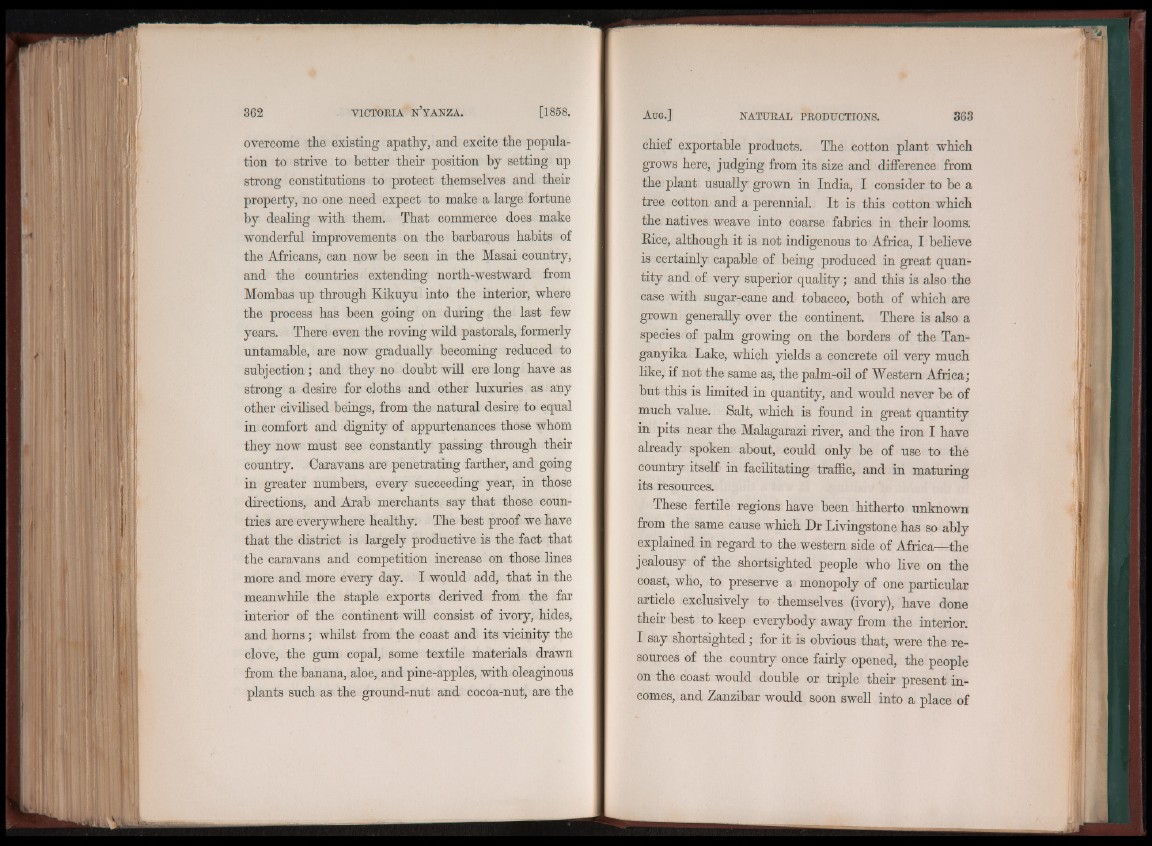
overcome the existing apathy, and excite the population
to strive to better their position by setting up
strong constitutions to protect themselves and their
property, no one need expect to make a large fortune
by dealing with them. That commerce does make
wonderful improvements on the barbarous habits of
the Africans, can now be seen in the Masai country,
and the countries extending north-westward from
Mombas up through Kikuyu into the interior, where
the process has been going on during the last few
years. There even the roving wild pastorals, formerly
untamable, are now gradually becoming reduced to
subjection ; and they no doubt will ere long have as
strong a desire for cloths and other luxuries as any
other civilised beings, from the natural desire to equal
in comfort and dignity of appurtenances those whom
they now must see constantly passing through their
country. Caravans are penetrating farther, and going
in greater numbers, every succeeding year, in those
directions, and Arab merchants say that those countries
are everywhere healthy. The best proof we have
that the district is largely productive is the fact that
the caravans and competition increase on those lines
more and more every day. I would add, that in the
meanwhile the staple exports derived from the far
interior of the continent will consist of ivory, hides,
and horns ; whilst from the coast and its vicinity the
clove, the gum copal, some textile materials drawn
from the banana, aloe, and pine-apples, with oleaginous
plants such as the ground-nut and cocoa-nut, are the
chief exportable products. The cotton plant which
grows here, judging from its size and difference from
the plant usually grown in India, I consider to be a
tree cotton and a perennial. It is this cotton which
the natives weave into coarse fabrics in their looms.
Rice, although it is not indigenous to Africa, I believe
is certainly capable of being produced in great quantity
and of very superior quality ; and this is also the
case with sugar-cane and tobacco, both of which are
grown generally over the continent. There is also a
species of palm growing on the borders of the Tanganyika
Lake, which yields a concrete oil very much
like, if not the same as, the palm-oil of Western Africa;
but this is limited in quantity, and would never be of
much value. Salt, which is found in great quantity
in pits near the Malagarazi river, and the iron I have
already spoken about, could only be of use to thé
country itself in facilitating traffic, and in maturing
its resources.
These fertile regions have been hitherto unknown
from the same cause which Dr Livingstone has so ably
explained in regard to the western side of Africa—the
jealousy of the shortsighted people who live on the
coast, who, to preserve a monopoly of one particular
article exclusively to themselves (ivory), have done
their best to keep everybody away from the interior.
I say shortsighted ; for it is obvious that, were the resources
of the country once fairly opened, the people
on the coast would double or triple their present incomes,
and Zanzibar would soon swell into a place of